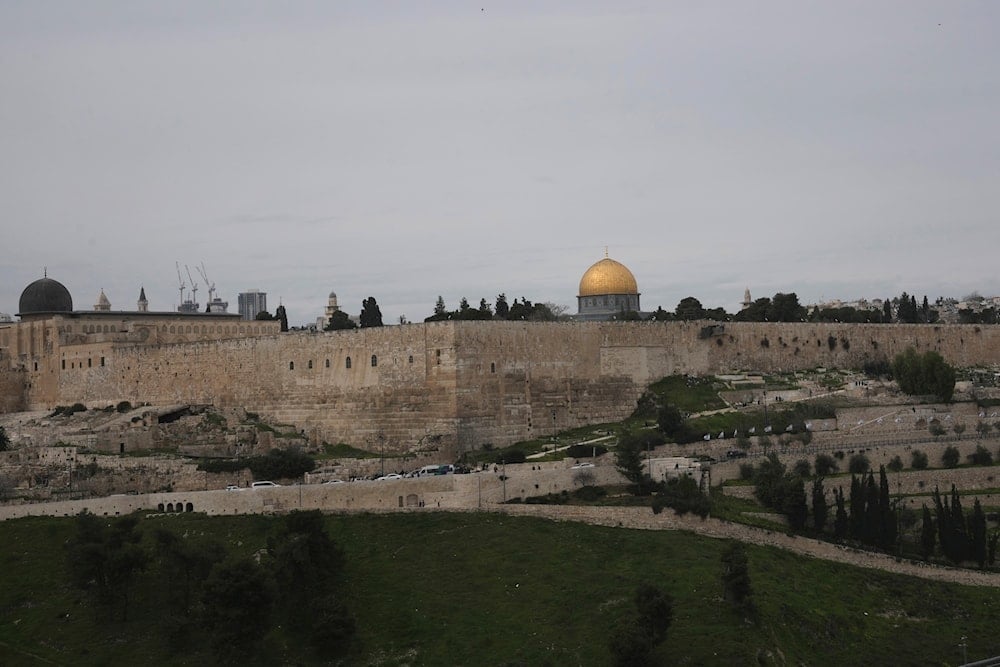'Israel' worried violence might spillover to other areas in Ramadan
Israeli media says there are fears within the security establishment that if no ceasefire resolution is reached before Ramadan, escalation will take place in the occupied Palestinian territories.
-

The Dome of the Rock Mosque in the al-Aqsa Mosque compound in occupied al-Quds' Old City during Friday prayers, as many Palestinian Muslims prayed outside after being denied entry, February 23, 2024 (AP)
The latest escalations taking place in the West Bank might snowball and spread into "Israel", the Israeli Kan public broadcaster said on Friday, citing concerns within the Israeli security establishment regarding the issue
Kan said the fears regarding violence spreading into the occupied Palestinian territories stem from fears relating to 2021's Battle of Seif al-Quds, which saw escalations all over occupied Palestine that started spreading from the occupied West Bank.
According to the Israeli news channel, Israeli security sources said they wanted a ceasefire deal to be reached in Gaza before Ramadan so as to avert any additional escalation.
Israeli newspaper Haaretz quoted informed sources as saying that the detainees-captives deal will mature around the upcoming month of Ramadan, adding that "Israel" will make use of the upcoming weeks to implement its plans before that time.
While the sources maintained that communications are still ongoing, they said it was still too early to determine if both parties will bring the deal into effect or halt it when the time comes.
Israeli officials are having a hard time predicting how Benjamin Netanyahu will act at "the moment of truth" or if will blow up the deal with Hamas for "political, security and personal reasons," the sources explained.
'Israel' fears 'explosive' Ramadan
Israeli military and intelligence authorities have expressed concern regarding the upcoming month of Ramadan, recommending that concerned authorities ease measures against Palestinians in the occupied West Bank and al-Quds.
Ramadan is set to commence in early March this year, and the holy month is synonymous with several occasions that Muslims celebrate. Recently, the occupation has severely restricted the entry of Palestinians to one of the holiest sites, al-Aqsa Mosque, in occupied al-Quds. The measure comes hand in hand with increased systematic oppression of Palestinians in the occupied territory, including wide-scale detention campaigns and assassinations against Palestinians in the West Bank.
In this context, Israeli military and intelligence officials have recommended that restrictions be eased, fearing that "Hamas takes advantage of the most important time for Muslims, as a chance to ignite the [West Bank]," Yoav Zitun, the military affairs analyst for Israeli news website Ynet, wrote.
At the core of discussions in Israeli decision-making quarters is allowing Palestinian workers entry into '48 occupied territories. According to Zitun, the Israeli authorities are discussing a process to permit 100,000 Palestinians to occupied territories. Thousands of Palestinian families seek work opportunities in occupied territories, due to degenerating economic conditions in the occupied West Bank and the Gaza Strip, which comes as a direct result of the Israeli occupation of Palestine.
Since "Israel" launched its aggression on the Gaza Strip, it has also banned all Palestinian workers from entering '48 occupied territories.
Israeli response to the ceasefire deal
Palestinian sources disclosed to Al Mayadeen earlier "Israel's" response to the Resistance's ceasefire proposal, which involves a three-stage plan with requests for several concessions but does not include the complete withdrawal of Israeli troops.
The first stage, according to the sources, will comprise a 35-day-long ceasefire and will have the possibility of being extended for an additional seven days.
The second stage could last 30 days, the sources added, noting that the third stage does not have a specified timeframe.
Concerning the clause on troop withdrawal, the sources stated that "Israel" requested substituting the word "populated" with "heavily populated" to indicate that the troops would remain stationed in uninhabited areas
They further said that "Israel" rectified a clause about rehabilitating hospitals but not rebuilding them.
Moreover, they agreed to suspend flights over Gaza for only six hours each day.

 4 Min Read
4 Min Read








